We spoke with royalty for this week’s episode of Voices from The Footnotes, our ROAAr library podcast. McGill royalty to be precise. Step back in time to 1949, 1951 and 1958, as Beryl Rapier, Dorothy Baxter and Rae Tucker Rambally bring us back to mid-century McGill Winter Carnival days as they relive their experiences with the carnival pageant.
McGill’s Winter carnival ran from 1948 to 1969 (read more about the history of the Carnival). Beryl Dickinson-Dash, pictured on the left below, made history in 1949 when she became the first Black woman to win a pageant of this kind in North America. Dorothy “Dusty” Baxter, was an architecture student when she won the crown in 1951. Rae Tucker, now Rae Rambally, was an undergraduate student from Trinidad, new to the acquired taste of a Canadian winter as she claimed the crown in 1958.
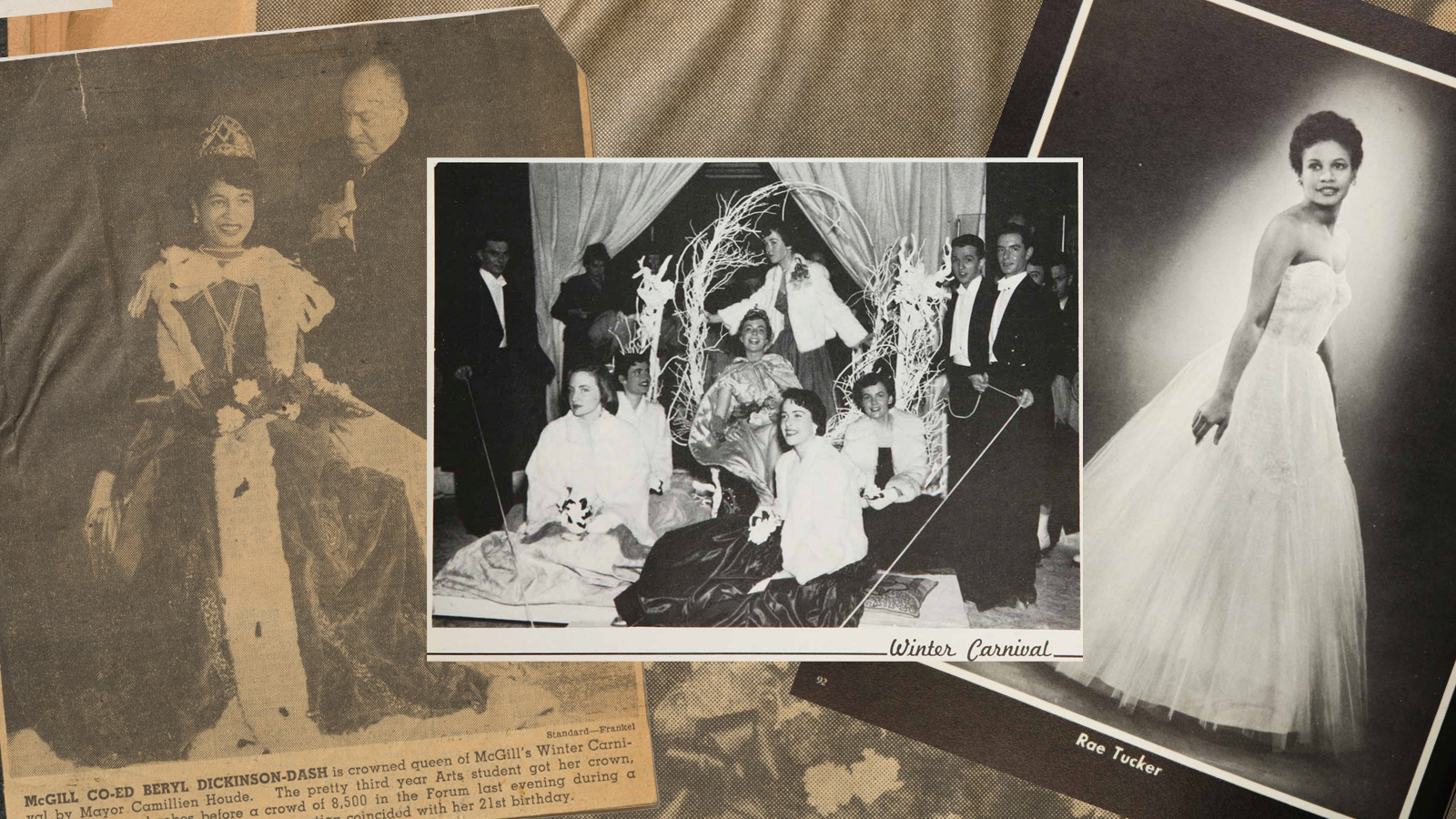
In all the 20 years of the pageant, Beryl, Rae, and Vivienne Poy were the only women of colour to win the crown. Every winner has a story, it was a pleasure and a privilege to speak with our three guests; their recollections are warm, unique, and often funny. Listen to the episode and celebrate Carnival spirit with a nostalgic trip down memory lane in the slide show below.
Explore More
- Hear more from Beryl in Episode 11: Generations Part 1.
- Listen to CBC’s The Doc Project by Julia Lipscombe, How Montrealer Beryl Dickinson-Dash made history as McGill’s first Black queen of Carnival.
- Eliza McCullum. “Queen of the Campus: The McGill Winter Carnival Queen, 1948-1969.” Canadian Content: The McGill Undergraduate Journal of Canadian Studies, Vol. 11, Spring 2019. Accessed Feb 1, 2022. https://www.mcgill.ca/misc/files/misc/canadian_content_2019.pdf
- Play Quiz That So, a McGill Library game that unites McGillians from throughout history in a trivia challenge that will test your wits. Host Max McMartlet and the game itself was inspired by a McGill Winter Carnival Programme from 1951.
Credits
- Host: Sheetal Lodhia
- Producer and Editor: Jacquelyn Sundberg
- Transcription & Research: Labiba Faiza
Guests:
- Beryl Rapier
- Dorothy Baxter
- Rae Tucker Rambally
Music
- Title song: Happy Sandbox, by Mativve, sourced from Freesound.org, CC BY 3.0
- Transitions: Horn lilt 2 by contextcollapse, Sombre Piano by Luckylittleraven, Happy and Groovy by Tyops, all sourced from Freesound.org, CC BY 3.0
- End credits: Happy-music, by monkeyman355, CC BY 3.0
Full Transcript
Beryl – Beryl Rapier, née Dickinson-Dash
Bradley Rapier – Beryl’s Son, present at her interview
Rae – Rae Tucker Rambally
Dorothy – Dorothy Baxter
Sheetal – Sheetal Lodhia (interviewer/host)
Campus Queens
00:02 Sheetal: Welcome to Voices from the Footnotes, a podcast series presented by the McGill University Libraries’ ROAAr team. Each episode, we will explore some of the hidden histories at McGill, looking at places, people and artifacts. The library collections are rich and interesting, but this series flows from the silences also present. It is our desire to gather stories and share them. It is our goal is to highlight voices who have often been overlooked in histories and in archives.
00:35 I am today’s host, Sheetal Lodhia.
00:40 Before we begin today’s episode, we acknowledge that McGill University is situated on the traditional territory of the Kanien’kehà:ka, a place which has long served as a site of meeting and exchange amongst nations. We recognize and respect the Kanien’kehà:ka as the traditional custodians of the lands and waters on which we meet today.
01:00 Sheetal: In today’s episode, we will hear from royalty – three queens in fact, crowned right here in Montreal at McGill’s Winter Carnival Gala. The McGill Carnival first took place in 1948. It became a campus tradition, running for over twenty years. Each year brought competition, pageantry, sports, and community, making headlines on campus and beyond. The reigning queen passed her crown on to her successor, who was nominated by her peers and elected by popular student vote.
01:38 We spoke with three women about their experiences as campus royalty, and their student experiences at McGill. We had the privilege of talking with the 1949 Carnival Queen Beryl Dickinson-Dash, now Beryl Rapier. And we caught up with two others as well – the 1951 Queen Dorothy Alexander, who was known in her McGill days as “Dusty Baxter”. Finally, we spoke with the 1958 queen, Rae Tucker, now Rae Rambally. I’ll let them introduce themselves.
02:08 Beryl: And I am Beryl Rapier. What more do you want to know? [laughter] I’m 92 years old, and I live in Las Vegas.
02:20 Dorothy: My name is, now, Dorothy Alexander. When I was Carnival Queen, I was in the second to last year of, uh, the, uh, engineering part of the architectural course, which had to be completed before you got in. So, it was kind of like a, a graduate school.
02:47 Rae: My first name is Rae, R-A-E. My family name is Tucker, T-U-C-K-E-R. My m-my name, my married name is Rambally, R-A-M-B-A-L-L-Y. And, I was born in Trinidad. Um, what else do you want to know?
03:31 Sheetal: The first official McGill Winter Carnival took place in February of 1948, with a full schedule of sporting and social events. Beryl became a sensation the following year. In 1949, she made history as the first Black woman to win a pageant of this kind in North America. There is in fact a great CBC Radio piece on Beryl’s Carnival Queen experience. We’ll put a link to that in the show notes.
04:00 Sheetal: We spoke with Beryl, Dorothy and Rae separately, but their experiences with the Carnival nomination process were similar. In fact, none of our interviewees volunteered for this beauty pageant. Beryl, Dorothy and Rae were all nominated by men. I asked Beryl about how she got involved with the Carnival Queen process.
04:20 Beryl: That’s another story, I was going with this guy and for his birthday, I gave him a picture. I’m not, my mother took me to a photographer and we had some, she was getting some pictures made anyway. And so, I gave him a picture for his birthday. And his birthday is in June, so I mean, I mean, I thought nothing of it and when, when school resumed, we went, our school started in October.
[04:57] Uh, McGill always started in October in those days. Um, his roommate, again, there’s another thing, I never went with a guy who had a car, who had his own place, or who wasn’t living with his mother. I mean, you know, that, that, that was- were the times. Anyway, he was rooming with this other guy th- I think he was from Barbados, and they were both rooming together. Well, when this, um, uh, competition started, he [the roommate] took the picture,
[05:30] his roommate did, and, and pres-, uh, entered it without my knowing anything about it. I’m coming to class one day and I see, um, hmm, I see these five, five girls’ pictures running these is the girls running for Carnival—no! No it was a bunch of girls, not only [Bradley: It was 20] 20, 25 or 26 or whatever. And I see m- I said, “gee that looks like my picture,” but I don’t pay attention. I go, I, I keep going. and then I think.
[05:56] And then I think, “no, but that is me!” And I go back, so, I, I say [laughs], “how did that picture get there?” And then in the, the McGill news it’s saying these girls are running and what we’re doing and we’re invited to this Tea, so I go home and I say to my mother, I said, “can you imagine? Layton enters me into a Carnival Queen thing. I mean, uh, me.”
06:26 Sheetal: For Rae, the experience was similar – she has a clear memory of the man who nominated her for the Crown.
06:33 Rae: Who nominated me? [Laughs softly] The person’s name, as I remember it, was Paul. He was not a student, he was a photographer, if I remember correctly, ’cause I had to dig deep into my memory bank to, um, to, because I asked myself the same question. Um, I remember him approaching me.
[07:03] And he, uh, he approached me, I would think, at the beginning of my second year at McGill, which would be 1960, as I went in 59. And sometime, maybe around October/November, about this time of year, and he said he would like, you know, he would like to recommend that I run for Carnival Queen, and I said, “oh, nice!” I was 20 [laughs].
[07:27] I mean, that was, that was very, that was quite a feather in my cap, you know, and I, I was quite, um, what’s the word I’m looking for, uh, I was overjoyed. I, I, I accepted it graciously, as graciously as I could.
[07:43] Now, the people who actually were nominated on who ran, I don- I know how I got in there, through this person, Paul, and, but, uh, and I was a student, and, um, it just rolled from there, you know. They would tell us, um, what to do, uh, where to go, which group, where we were being introd-, who, to whom we were being introduced.
[08:13] We went around campus, and to all the different faculties, the Law Faculty, the Me- Medical Faculty. And h- I remember when we went to the Medical Faculty, my two brothers were sitting in the class, because I had two brothers who were medical students at the time. So, um, and you know, you introd— uh, we, but, but by then, the, the girls who were running for C— because it wasn’t j- there were five of us, but out of, of, before those five, there were about 20.
[08:52] And, we, it was an open thing, running for Carnival Queen.
08:58 Sheetal: Rae recalls the selection process that took place at the Queen’s Tea, as it was called. Over tea and snacks, all of the nominees met with an intimidating panel of judges, who narrowed the candidates down to five women, who then became known as the Queen’s Court.
09:08 Rae: Um, there was a Queen’s Tea that was held, where they made, uh, the selection of the five, from the 20. And, we met at, uh, Royal Victoria College, on Sherbrooke Street, and, which is now the Music Faculty, I believe. And, um, Muriel Roscoe was the warden of that, of the, um, of the Royal Victoria College, at the time.
[09:46] And Royal Victoria College was the residence for girls who came from out of town.
I did not live at Royal Victoria College, because we couldn’t afford it. I came, and so my brothers, we invented a cousin, they found a cousin for me, a fam-, a relative, and, and, because we had to work, you know, do part-time jobs, and to earn some extra money, et cetera.
[10:11] We weren’t, we weren’t wealthy by any means. I mean, we weren’t poor, but we weren’t wealthy. So that’s, that’s the kind of, um—so we met at Royal Victoria College for the Queen’s Tea and five girls were chosen, and I was one of them. Yeah.
10:30 Sheetal: Wow. [Rae: Yeah] Who were the judges?
10:33 Rae: Muriel Roscoe was one of them, and I believe, the students who— because I’ve, you know, when it’s happening to you, you’re not necessarily analyzing what’s going on in the background, [laughs] okay. So, but I think there were students who were on these committees, like the Carnival Committee, the Winter Carnival Committee, uh, choosing the girls, uh, organizing the voting, because it, it was done by vote, um, of the whole campus.
[11:06] Everybody was involved. Um, so, so those were the people who were in the background, the administration of it, that’s, which is something I didn’t, I wasn’t noticing it, or wasn’t observant. I was too busy being pushed along from here to there, so, yeah. So, who were the people, yeah.
11:29 Sheetal: I suppose I was wondering more whether they were, were they faculty? Or were they—
11:33 Rae: No, I think it was students. The students ran different committees, different societies on campus. And as I was jogging my memory and looking back in the yearbooks, because I have the yearbooks, do you have them in physical form? They’re heavy things [Sheetal laughs]. I have two here, and my legs, uh, I, I rested them on my legs and, uh, I could get a fracture from them. They’re huge.
[12:01] So, there were different, uh, groups, and committees, and societies on campus. And I think it was, it was a way of also getting students to, to run the, the, these societies, to understand how they’re put together, and, uh, so I think those people were in the background. The blood drive, the, uh, the, um, the Flying Carpet, the Red and White Review, all those, um, it’s students who were at the back.
[12:35] McGill, I suppose, funded it. They were, they had, you know, they had funds from McGill to do it, but, um, the students did it, yeah.
12:46 Sheetal: As Rae points out, it was students who organized the carnival events. Beryl recalls that students also led the campaigns to rally support for the Queen candidates.
12:58 Beryl: It’s so funny when I, when this, um, uh, competition stuff was going on, I had two Jewish guys who were in the same economics class as me and they kept saying to me, “you need to come in late, you know, and not go all the way back. You need to come in late and walk right up to the front.”
13:17 Bradley: Make a commotion!
13:18 Beryl: I said I’m not doing that! “Yes, you gotta promote yourself, you gotta do that [laughs]” And so—because I used to just kind of always be on time and just get in and sit in my seat, you know what I mean. Don’t make any waves. But anyway, I did that a couple of times. And the professor called me out and he [one of the Jewish guys] said “I told you! Everybody knows who you are now.” [Indistinct]
[13:36] [Laughs] So it kind of worked. And anyway, I did it once. I didn’t, I mean, I didn’t, that’s not my style. So, but I, he, I got into trouble because he mentioned my— “You’re late, Miss Beryl Dickinson-Dash!” So, he said, “Do you see what I said? Everybody knows who you are now.” [Laughs] [indistinct] So, so that’s how that went, but I never thought in a million, or, a mill- I never thought that would happen, but it happened.
13:59 Sheetal – Rae too found support from international and Jewish student groups.
14:03 Rae: Um, I know I got the votes of a lot of the international students, the Jewish students, uh stuck with me. I only found— they org- they had a separate organiz- or-organization, um, uh, to, to, to promote me. And I think word of mouth and, uh, you know, talking to each other and, and, and, uh, and that was going on building up to the night at the Forum. So that’s, uh, that was how that, that worked out.
14:38 Sheetal: Both Beryl and Rae described Montreal’s Black community as “close-knit” and “small.” Rae had definitely heard of Beryl.
14:47 Rae: I’ve never met her, but I, I heard of her. She preceded me, and, but by, by nine years, I think.
14:55 Sheetal: Okay!
14:56 Rae: Yes, yes. When I came, uh, I heard that— and she came from Trinidad as well.
15:02 Sheetal: Ye- her parents did, yes, exactly. [Rae: Yes!] Yeah.
15:04 Rae: I’ve, I’ve, I met her mother, and I know her mother, because I worked in the, in the Montreal community, uh, during my days as a social worker in practice, and, and in the, and reaching out to the Black community in particular, and her mother was part of that. [Sheetal: Oh, that’s so nice!] So, I’ve never met Beryl, but I’m, I know, I know, I knew Mrs. Dash, yes.
15:29 Sheetal: In fact, Beryl told us that, um, [Rae coughs] the Black community is, was pretty tight knit because, [Rae: Yes] you know, so few people [Rae: Yes] and, and this is the, this is the case.
15:38 Rae: And I was very much part of it during the years, first— well, as a student, not as a student so much, ju- ‘cause those were my student days. But after, when I was, uh, w-when I was practicing in social work, uh, that’s when, you know, we were getting the Black community together, and identifying issues, and trying to deal with them, that sort of thing. Yeah
16:02 Sheetal: Oh, that’s really great.
16:04 Rae: Yeah.
16:05 Sheetal: Who, [Rae: And that—] who would have anticipated a connection already?
16:09 Rae: Well, it’s a small community [Sheetal: Yeah [laughs]]. Yeah, it’s a small community [laughs].
16:14 Sheetal: Beryl grew up in Montreal’s Black community in Saint-Henri. Her father was active in the Railway Porter’s Union, and her mother was active in many Black community groups. The Queen’s Tea put Beryl quite far outside of her comfort zone, where she was the only Black student.
16:32 Beryl: Layton enters me into a Carnival Queen thing. I mean, uh, me. We used to say in those days “coloured.” The color— “you know, I have no chance. I’m not going to—.” My mother said, “you paid your fees! we’re going down there, we’re going to get you a little outfit, and you’re going to the Tea.”
[16:50] But I mean, I was nervous. I mean, I was really, really nervous because they were all white and they were all very prejud- not all, but a lot, ‘cause a lot of them were making remarks. And, and it’s so funny ’cause I mean, I took the streetcar and we all got there, there’s no TV, there’s none of that. There is somebody interviewing, um, you, like the radio, with his little mic thing or writing notes.
[17:19] And, uh, and I’m, I, now, [indistinct] remember there was one guy, I think he was from The Star. And he said to me, uh, “you’re a little nervous.” I said, “well, you know, I, I don’t think they’re liking me being here.” And he said, “you’re, you’re, you have every right to be here. Now cut that out, now you just hold your head up and walk.”
[17:43] So anyway, they, they interviewed, they cut it down because there were about 26 of us to start, and then they cut us down to about 11. Well, the 11, they, um, interviewed us really h-harshly, you know, and, and, more in depth, I should say.
[18:00] And so, um, then they said, “well, you know, you know what you’re here for, and we have to call, we have to call the numbers for the five of you.” Well, you know, my, I had a hyphenated name, Dickinson-Dash, and so I was up there too in the alphabetical order. So they said, um, “Beryl Dickinson-Dash!”
[18:30] I thought, “no, it couldn’t be.” They called me, they c- and then they called these other four girls, and they said, “the five of you now will be running for the Carnival Queen. Well, I mean, I mean, I, I, I was ecstatic, and I remember I didn’t even wait to go home, that was the first time I ever phoned my mother on an outside line, I called my mother.
[18:55] I said, “mother can you believe this? I am going to, I, I’m going to probably be one of the ladies in waiting” never thinking I’m going to win anything. Nothing like that, nothing!
19:07 Sheetal: The process for all three of our guests was the same. After nominations and selection at the Queen’s Tea, the McGill student newspaper published photos of the five members of the Queen’s Court. After that, the campaigning started. The student body had the chance to vote for their Carnival Queen. Like Beryl and Rae, Dorothy Alexander – Dusty – was nominated by one of her peers. She swept the podium with a record voter turnout in 1951.
19:37 Dorothy: It wasn’t my idea at all! Um, I was in, then, as I say, in the Engineering Faculty, and they got their— and of course, I knew a lot of people studying Engineering, all men. Um, and I have to admit, one of them—and it, and it may have been John Jonas, or among them—uh, said,
[20:07] “look at the size of the engineering, uh, school! We could easily get our Carnival Queen in, because we’ll all vote for her” [Laughs]. And so, not that I’m ugly, [laughs] but I’m afraid the year of 51, the other girls didn’t have much of a chance, and I, I have read, just recently, since I’ve known you, and kn-knew that, um, I was going to talk to you,
[20:40] there was more voting that year. More, more people came out to vote, and they were all engineers [laughs].
20:50 Sheetal: So, you stacked the votes, as engineers.
20:54 Dorothy: I will dare say that the whole engineering school that voted, voted for me because that gave them some, uh, je ne sais quoi [laughs]. Engineering is, some—well, well, those boys were all there to become engineers, and some of them became very good ones.
21:52 Sheetal: Just like her classmates, Dorothy’s campus life was busy. She knew from day one that she was going to be an architect. She found support from her classmates, but she also had local connections. She moved to Montreal from the South Shore to study at McGill, so friends and family were not that far away. In contrast, Rae came to McGill as an international student, following in the footsteps of her two older brothers. For both women, the experience of the pageant was a change of pace from their busy lives on campus. Rae, in particular, was active in student groups.
22:29 Rae: I was involved with the West Indian Society. We had a West Indian group.
Um, we, I was involved with the, the Flying Carpet, which was a multinational, um, show that was put on. You know, the Chinese group, it would be an African group, it would be a Caribbean group, it would be, um, you know, uh, an Indian group. Uh, so, uh, and I actually, I think I was president of one, 1959, I was president of the Flying Carpet.
[23:09] There was the Red and White Review as well, and I was trying to remember the name of the one that I was involved in, and for the life of me I can’t remember it, and I couldn’t find it, um, in, in the yearbook. But, uh, so, the Choral Society, I sang in the Choral Society, uh, the Red and White Review, the Flying Carpet, the West Indian Society, uh, those were the ones, and that was enough, I could tell you. That was enough.
[23:52] I was, uh, [laughs softly] I was very busy, and it did impact negatively on my studies [laughs softly]. I was fortunate to graduate. You know, as I look back—and I have a granddaughter who is at McGill right now—and I look back and think, the amount, the number of activities I was in, and the, um, and I worked part time, I, you know, I did babysitting, I did, uh, I worked for Bell.
[24:23] It was called Bell Telephone at the time. Because I had French as one of my, my, um, the languages I studied, I was able in those days to land a job, part-time job, evening work, at Bell. So I’d do 4 hours and go back to my studies. So, I was, I was stretched pretty thin. And, um, it impacted negatively on my, I barely made, I barely graduated. I was a much better student second time round, ’cause I did go back to McGill many years later.
24:55 Sheetal: And that was for your social work.
24:57 Rae: That was for the, for my master’s. Had a lot of difficulty getting in because it came back to haunt me. My marks weren’t good enough and social work was, uh, they would, they had just introduced the master’s, the BSW and, and the MSW. And, there were lots of people who were applying to, because it was a, in the old days, like nursing.
[25:23] You know, it was a, it was a nice profession to, to, to enter, to be. So, I, um, but I did get in. I persevered, took extra courses, brought my marks up, and, and got in and got my masters. But I was a much better student second time around because there was no playing around, I had a family by then [Sheetal: Mm-hmm]. And a mor- and a mortgage, as I like to tell people.
25:51 Sheetal: Like Rae, Dorothy was busy as an undergraduate too. She was a part of a Greek women’s fraternity
26:00 Dorothy: Uh, well, [clears throat] I was in Kappa Alpha Theta, which was on that street that runs down the side of the university. You know, it’s like a big block of property, and the first street that happens—I don’t happen to remember its name—uh, was where the fraternity houses were located.
[26:26] And I don’t know if the other women’s fraternities called themselves fraternities or sororities, but our, uh, Kappa Alpha Theta was a fraternity. We were all brothers.
26:41 Sheetal: Wow.
26:43 Dorothy: It, it was a social gathering place, you know. We had meetings, we had things that, uh, we were concerned about. Uh, I don’t remember one of them [laughs], but, uh, we, we tried to do some good, progressive things [notification sound]. It wasn’t just, sort of, balls and, uh, dances, and.
27:14 Sheetal: How many of you were in it? How many of you were in this, uh, fraternity?
27:18 Dorothy: Oh, in the 20s. 20 odd.
27:24 Sheetal: And were you close with each other?
27:28 Dorothy: We certainly all knew each other. We were in, of course, we were studying different things. I was the only architect, um, which impressed everybody [laughs] [sighs].
27:44 Sheetal: It’s still impressive. There are still very few women in engineering and architecture.
27:51 Dorothy: Well, I think in the States there were probably more women. But it’s, in Canada, it was, uh, definitely not, uh, such a good idea, because we also had to work in the summer and polish our, whatever we could, main- namely the drawing. But we had, we had to get experience in architect’s office
[28:22] And the first o-office that I went to just said, “we don’t hire women!” [laughs] And, uh, I ended up, uh, working for Canadian Car and Foundry, in the drafting room. And I was drawing aeroplane wings [laughs]. And, so, it was a, a while before I got into a, a real architect’s office.
[28:53] I, I, then the next year, uh—no, I, I worked for Bechtel, um, uh, doing drawings. Uh, they are a large engineering firm, they certainly still, still exist, and they are, I would believe, inter- international.
[29:16] Well, I only had to work for them for two years, [noise], and they were very nice to me. Now, that’s the differen—I mean, they ed-, they helped educate me, uh, in drawing. And, uh and I became a, a nice, a good draftsman.
[29:42] We also had, in the summer, one year we had a survey school. That means you go out with the transit, and, uh, learn how to, uh, lay out land. So, we were kept pretty busy. And the people in my architectural class and my professors were—I was just one of the boys [laughs].
30:16 Sheetal: Did you feel like they, they—when you say you were one of the boys, uh, were you the only woman there?
30:24 Dorothy: Yes, in my class.
30: 26 Sheetal: Yeah.
30:27 Dorothy: Um, but the class was only 12 or 13.
30:32 Sheetal: Okay.
30:33 Dorothy: It was very small. And it w—it had its own little Victorian building, so it was like working in a converted house. It was all the early, the early years. I guess they have a big architectural school building now.
30:52 Sheetal: The architecture school now has a beautiful new building, but other things about McGill have not changed at all. Men still outnumber women in the STEAM streams. But campus groups are still crucial ways for students to connect with one another. This is particularly true for international students like Rae. She arrived as a McGill undergraduate from Trinidad at age 20. The following year she was crowned queen of a Winter Carnival. She had never even experienced winter before she came to Montreal.
31:26 Rae: No, no. I had never experienced winter. I, I always tell the story of—okay, we in the Caribbean, our education, we learned about winter, we learned about spring, whereas in the Caribbean we have literally two seasons: the rainy season and the dry season.
[31:51] Uh, so now, uh, you know, but our education taught us about—is it Woods, what’s the, uh, who talked about the, the sea of golden daffodils? And I remembered as a 12/13-year-old, trying to imagine what a daffodil looked like, a sea of golden daffodil. Well, we had bougainvillea and, uh, not daffodils, but we didn’t learn about, well, we lived with bougainvillea, we learned about daffodils.
[32:21] So, uh, the Canadian winter, again, it would have been an academic exercise, something you learned from a book. Um, something you imagined. Uh, and I remember my very first winter. I was walking along with a couple friends, a couple friends I had made, uh, we took the same classes, and it was about November and, you know how the season changes, and you can feel, you can feel snow in the air.
[32:54] And I remember we were walking along just outside the Milton Gates, going up the hill, and, um, she suddenly tapped me on my shoulders and she, and she pointed her finger up in the sky, and I said, “oh, snow!” [laughs] And that was my first experience of snow, ice falling from the sky, [laughs] you know. That was, uh, so, I’d had no exper-, I, I didn’t know how, well, you learn how to dress, people have coats.
[33:24] My brothers saw to it that I had the right attire and, um, uh, but you know, I, you know, getting the winter boots and the, the, the gloves and the mitts and the whole 9 yards.
Yeah, so that, I had no experience of winter, except from a book, or may- maybe even a movie.
And we, you know, I’m, we’re going back a very long time for me, uh, even movies.
34:44 Sheetal: The Carnival Queen was crowned every year at a gala. In the early years of the pageant, this gala was held on ice at the Montreal Forum, the famous home of the Montreal Canadiens Hockey club. The gala drew in celebrities and university VIPs like Cyril James, the principal of McGill. While there are photos, news clippings and memorabilia in the McGill archives, these women remember what it was like to be on ice at that moment. Beryl recalls the role that Camillien Houde, the mayor of Montreal at the time, played in the ceremony.
35:26 Beryl: You know, it was at the Forum in Montreal and of course it was on ice so they had built this, um, big sleigh thing, you know, they I was on top and the four girls like that [gesturing around her]. And so, um, they, they, it was at the, um, Forum?
35:48 Bradley: I think so. About 8000 people there?
35:50 Beryl: Well, what, yeah, where, where they skate now, where they do all that, it was the Forum. Yeah, it must have been the Forum, right there on, um, Atwater. Anyway, they went, put the place in darkness before we were coming out and of course it took a while. Well, what had happened: Mayor Houde [Camillien Houde], who was a very heavy man, was going to crown me and they had built these step—I was up and the girls were on either side, and so they had built these steps for him.
[36:25] He stepped on the first two and broke them! So they [wheezes] had, they had to try to fix it because people are out there waiting for me to come out. Well, I didn’t come out, we didn’t come out for a while. And my mother, my poor mother, she said, I was, she said, “I thought they’re trying to take away my daughter [laughs softly] and trying to kidnap her or do something with her, it’s taking so long to—.” She was so nervous that they took so- we didn’t come out for so long [laughs].
[36:45] But that’s what happened with the, with the, with the sleigh thing. That, it was funny because, I mean, he was a big man, you remember a picture of Mayor Houde [asking Bradley]?
37:00 Bradley: [Indistinct]
37:01 Sheetal: I’ve never seen what the mayor looked like at that time. I’ll need—I’ll look it up!
[Bradley and Beryl’s voices indistinct]
37:05 Beryl: Yeah, yeah, look it up, he’s, he’s, he’s really, really a big man.
37:09 Bradley: And then the Prime Minister was there.
37:10 Beryl: I saw the prime minister,
37:12 Sheetal: Wow
37:13 Beryl: Yeah, he, he’s ni- he was a very nice man, yeah. Yeah, I have pictures in, in my scrapbook, they’re all in there, all, uh, all those pictures. Oh yeah, it’s a time of my life, but listen, [claps] so long ago! [Laughs]
37:29 Sheetal: Dorothy too recalls Mayor Houde at the coronation. She was on the ice for her entrance, in a float, with the other members of the Queen’s Court. She remembers impressions of the Forum, full of friends, fraternity sisters, engineering students, and family – along with the funny slip-ups that occur at every major event.
37:49 Dorothy: I dare say they were there. It was very hard, with, looking at Mayor Houde [laughs]. And, uh, and the girls were on, you know, the corners. I saw, I saw the backs of their heads, and, and one of them was, uh, was behind me. Um, yes, it was a, a very exciting time,
[38:20] but not the kind of exciting night that you remember the details of, just, just the, uh, lit- funny little things that happened. And one thing was I k- I kept hearing someone calling my voice, and my cousin, who had come all the way over from Saint-Lambert—he was my older cousin—to s- to say hi [Sheetal: Hmm] and to watch.
[38:51] Uh, at that point, we were—I think there was a hockey game, and then we were walking on the mountain in the dark, and just generally being paraded around. Well, how far my memory [both laugh] goes back on the subject of the McGill Winter Carnival 1951, I wouldn’t be too sure [laughs]. I mean, I do remember it, but not the, I don’t remember the crown being put on my head, but it was all so crazy.
39:28 Sheetal: So it makes me think that they did something different every year?
39:33 Dorothy: Yes, well, th-this, uh, float was pulled across the ice, and, uh, that was not a good idea [laughs]. Uh, there were men in tux-, uh, McGill men in tuxedos, pushing this float, which tipped, and everybody was laughing. And, uh, a very interesting thing is behind me, beside, there was a woman behind me, uh [it] was mayor Camillien Houde.
[40:10] Have you ever heard of him? Yeah, he was the biggest rascal [laughs]. Suitably, I’m sure. Suited and seated [laughs]. And, and he was having the time of his life [laughs] and laughing and saying things to the audience. I guess that was a, an opportunity for him to, uh, get some prime time [laughs].
40:46 Sheetal: According to Dorothy, Camillien Houde, the mayor of Montreal, was a burly Frenchman, with a permanent smile on his face. He was mayor of Montreal four separate times between 1928 and 1954. There was also, according to many, a great deal of corruption during that time. Montreal’s finances were in terrible shape. In 1939, Houde became notorious, openly opposing conscription, with a public statement published in the Montreal Gazette. This earned him a 4-year term in an internment camp at Petawawa and put an end to his term as mayor. Despite this, he was back in office, and gladhanding all around by 1951, when he crowned Dorothy Queen at the Montreal Forum.
41:37 Dorothy: Well, there was corruption, but he was a, a very burly Frenchman, always with a smile on his face. He, uh, he enjoyed himself [indistinct]. In the first place, he was in power for years and years. Years and years!He was a young man, started—he was a, quite an old man, uh, the last time I saw him, in 1951. So, I don’t know whether that’s legal in Montreal or where they have term limits now.
42:30 Sheetal: Rae describes the process of shopping for her dress and her winning night.
42:36 Rae: That was, that was all organized for us. What I remember is we, we were told where to- we had to go to get the dresses. It was on Park Avenue, Lower Park Avenue, going towards, between Sherbrooke Street and what’s the next one? Milton and above.
[43:00] Uh, there were lots of stores, fur shops, uh, that sold furs, that sold dresses, uh, that, and we, I remember going to one of those to get the dresses. Uh, and you’ll see the dresses are all the same, they’re designed the same, so it was the same, it was the same store that provided the dresses, and they were rented. They were not bought, ‘cause we had to return them.
[43:27] Um, uh, the fur stole, ’cause I have, I just saw myself in a fur stole, and um, that was, that was loaned, on loan, and uh, and we had to return those, yeah.
43:42 Sheetal: Actually, that’s really wonderful, so that, you know, that the, the store had a program set up with McGill so that you didn’t have to [Rae: That’s right, that’s right] pay out of pocket.
44:00 Rae: I don’t think I would have been able to afford the dress. I, I would have had to choose between the dress and a winter coat.
44:07 Sheetal: Yeah
44:08 Rae: And I know what, what I would have chosen.
44:11 Sheetal: [Laughs] Yeah.
44:12 Rae: Practical, yeah.
[44:16] The night of the Carniv- of the, of the crowning was a very interesting experience.
We got our dresses, we were told where we had to be, I think I took a taxi.
I didn’t have the same support system that the local girls had. The other four all had their families here, and that makes, uh—you know, things like the clothes you wear, how you dress, um, you know, jewelry from your aunt or your sister, your family, I didn’t have that.
[44:50] But you know, one or two of the students were really very kind and loaned me stuff. And, um, so we, we were told we had to go—it was done at the Forum, the c-crowning was done at the Forum.
[45:07] And, we got there, and we were shepherded to the area where the hockey players went. It’s, it’s a basement area of the, of the Forum, and we sat, we sat, um, you know, all dickied up, and our dresses, and, and prettied up. And, there was a game going on, and then a show going on.
[45:35] So, you know, this went on for like a couple hours almost, and we were at the back. We—again, how it was organized, I remember we were, they designed something that looked like an igloo. It opened out with four flaps, like this way, and that way, and that way, and there was a seat in the middle.
[46:05] And just, we, we sat and we chatted. We were very cordial, we were very nice, and, um, I, [laughs softly] I learned a lot about how to be, how to compete and be nice at the same time [laughs] when you don’t really feel that way, but I learned that. So, we sat and talked, and the t- we were told what time we would have to, to go out on the ice.
[46:39] And just before we went out onto- it was time to go out on the ice, we were told who, who the winner was. So, the five of us are in this room, and we each went and sat into our igloo, and then they closed it. It’s like a leaf, you know, where you t-, it, uh, they closed it, and we were pushed onto the ice and positioned.
[47:11] And while we sat there, leading up to it, you know, the ceremonies and, I don’t know, which group did what and won which prize, and all that sort of thing leading up to it, and ours was the last, the crowning of the Queen was the last, um, uh, event, the last on that, um, agenda. And I know that a lot of the Caribbean students and other people came to the Forum that night.
[47:47] Of my two brothers, one could not attend [laughs] because he was so scared. Because what was, what I was doing, what was, what I was entering, and what was happening was not something that normally happened in Montreal, in those days. And my oldest brother, he couldn’t come, and he didn’t come.
[48:12] And I know all the students, the Black students, the overseas students, they, um, they, they, all, the, the Forum was, was full, and I didn’t realize how full the Forum was until we opened the igloo. So, they started with the runner up number five. 5, 4, 3, 2, 1, yeah. Runner up number five, and then, you know, big applause. Four, big applause. Three, big applause.
[48:41] Two, the place exploded, because there was just one person left, and, that was it. And I was crowned by the Principal and Vice- and Vice-Chancellor of the university, Cyril James. Um, and I remember going back home that night—I, t-the applause just seemed to, to go on for an eternity [laughs].
[49:10] That’s, I, I was 22 years old. Can’t really believe I was ever 22 [laughs]. My granddaughter is 20. Yeah, uh, it was, it went on forever. And I think, after Beryl, I broke a barrier, I, you know, um, that night. But what, what was interesting was that it was by campus-wide vote.
[49:40] Um, so that’s, uh, that was how that, that worked out. And then of course we got presents, and jewelry. I still have a mother-of-pearl something bracelet and [noise] necklace, I still have it, you know. Um, and, but then I was gone, for ten years, and that’s basically the story.
50:10 Sheetal: The legacy of the Carnival at McGill is much more than the tangible objects and records that survive in our archives – the programs, pins, photos, and news clippings. Each year, a cohort of talented women were in the running for the crown. The student body rallied around them in a show of school spirit that we rarely see today.
[50:33] But what happened after the fun and festivities were over? Stay tuned for further episodes, where we hear from each interviewee about their experiences after the pageant and their studies at McGill.
51:03 Sheetal: As always, look to our show notes for additional material, such as timelines, photos, links to archival materials, and more. Many thanks to today’s royal guests Beryl Rapier, Dorothy Alexander and Rae Rambally. Beryl is featured in another episode on Black History, please check it out on our website.
Thank you to Professor Nathalie Cooke, Director of this project at McGill Library’s ROAAr team and to Jacquelyn Sundberg, Associate Producer. Our title song “Happy Sandbox”was composed by Mativve and sourced from freesound.org. All composers are listed in our show notes. I’m Sheetal Lodhia, thanks for listening!




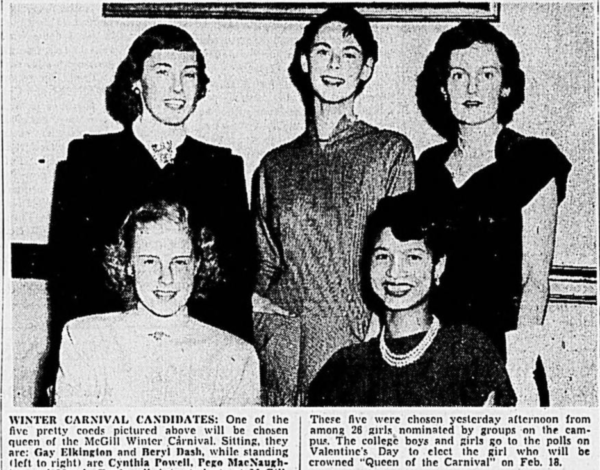
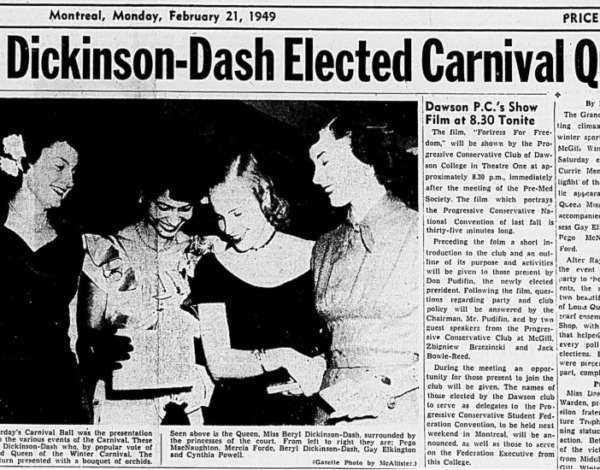
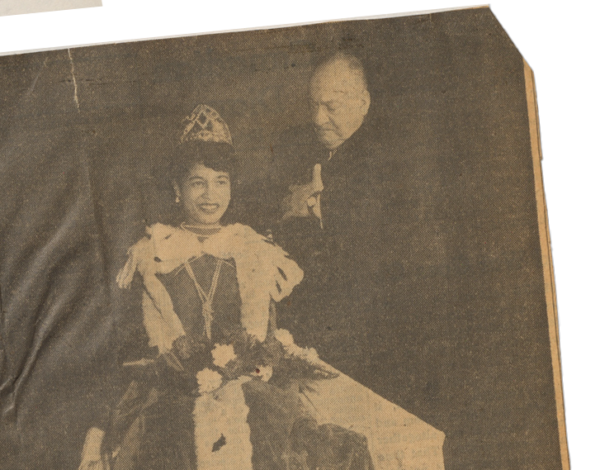
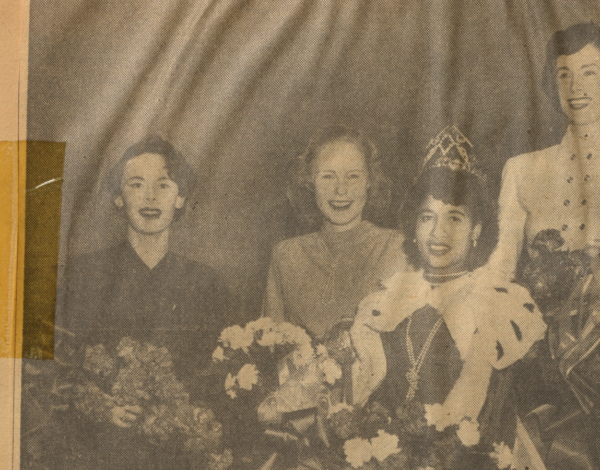
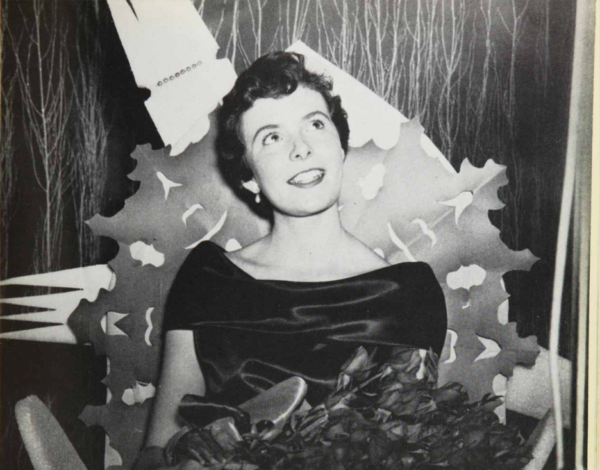
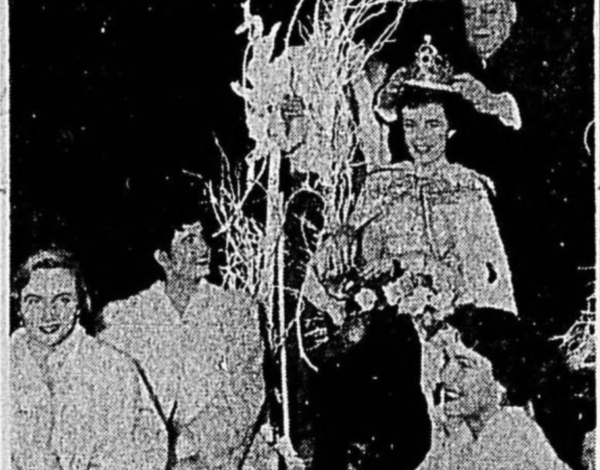
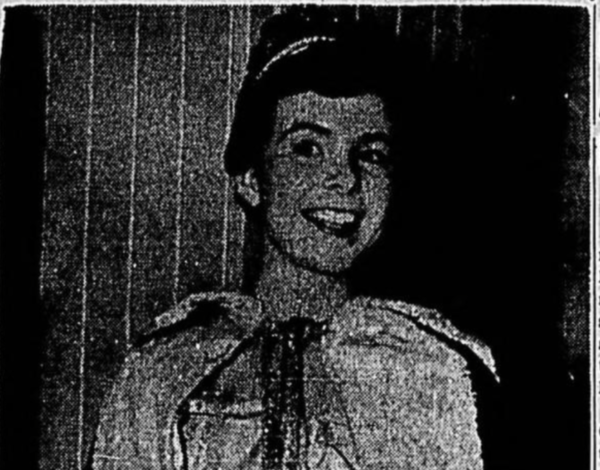
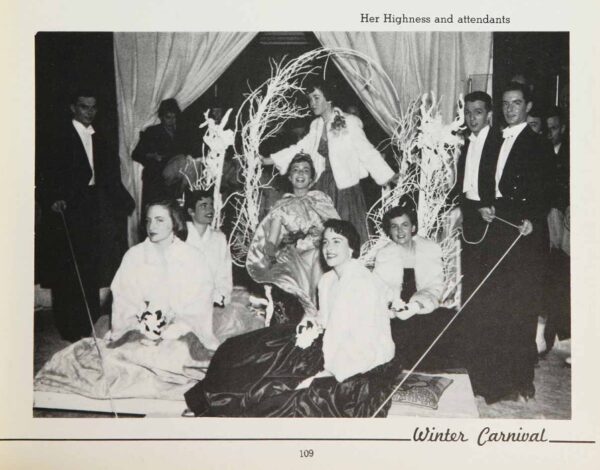
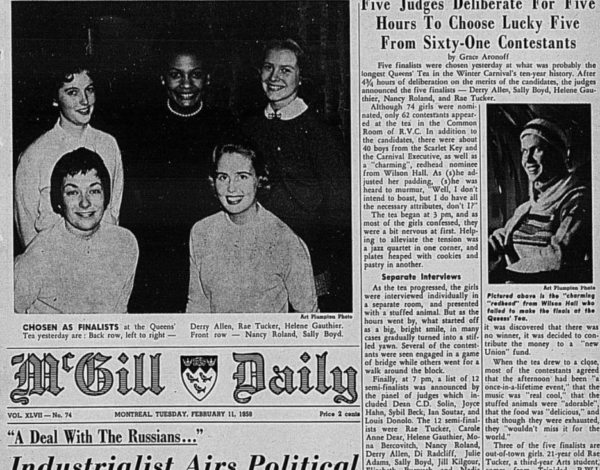
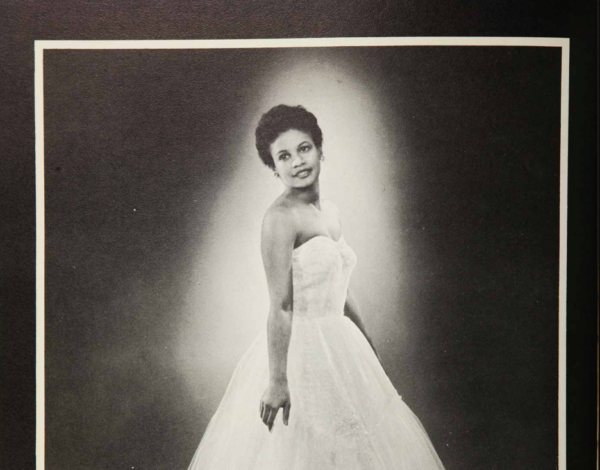
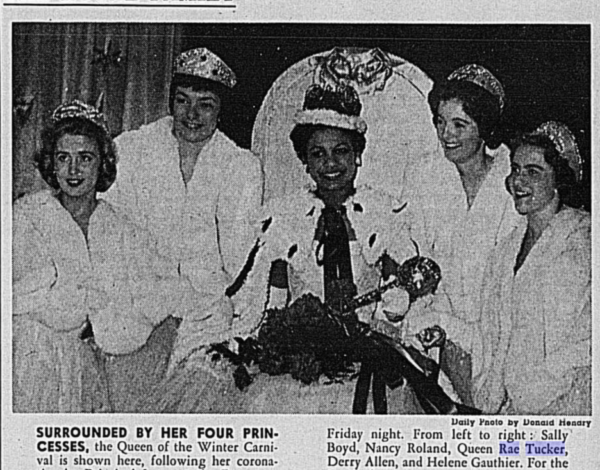










Leave a Reply
You must be logged in to post a comment.